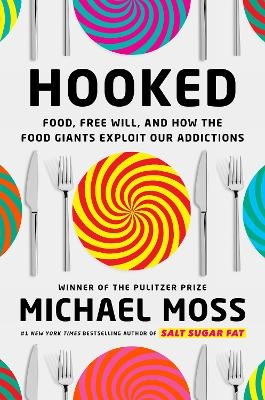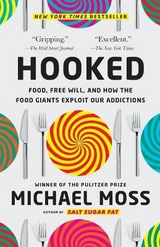
Hooked
Random House USA Inc (Verlag)
978-0-593-24325-1 (ISBN)
The processed food industry has managed to avoid being lumped in with Big Tobacco which is why Michael Moss s new book is so important. Charles Duhigg, author of The Power of Habit
Everyone knows how hard it can be to maintain a healthy diet. But what if some of the decisions we make about what to eat are beyond our control? Is it possible that food is addictive, like drugs or alcohol? And to what extent does the food industry know, or care, about these vulnerabilities? In Hooked, Pulitzer Prize winning investigative reporter Michael Moss sets out to answer these questions and to find the true peril in our food.
Moss uses the latest research on addiction to uncover what the scientific and medical communities as well as food manufacturers already know: that food, in some cases, is even more addictive than alcohol, cigarettes, and drugs. Our bodies are hardwired for sweets, so food giants have developed fifty-six types of sugar to add to their products, creating in us the expectation that everything should be cloying; we ve evolved to prefer fast, convenient meals, hence our modern-day preference for ready-to-eat foods. Moss goes on to show how the processed food industry including major companies like Nestlé, Mars, and Kellogg s has tried not only to evade this troubling discovery about the addictiveness of food but to actually exploit it. For instance, in response to recent dieting trends, food manufacturers have simply turned junk food into junk diets, filling grocery stores with diet foods that are hardly distinguishable from the products that got us into trouble in the first place. As obesity rates continue to climb, manufacturers are now claiming to add ingredients that can effortlessly cure our compulsive eating habits.
A gripping account of the legal battles, insidious marketing campaigns, and cutting-edge food science that have brought us to our current public health crisis, Hooked lays out all that the food industry is doing to exploit and deepen our addictions, and shows us why what we eat has never mattered more.
lt;b>Michael Moss is the author of the #1 New York Times bestseller Salt Sugar Fat: How the Food Giants Hooked Us, a Pulitzer Prize winning investigative reporter formerly with The New York Times, a keynote speaker, and an occasional guest on shows like CBS This Morning, The Dr. Oz Show, CNN s The Lead, All Things Considered, and The Daily Show.
Chapter One
What s Your Definition?
Steve Parrish didn t smoke until he started working for Philip Morris at age forty.
This was 1990. Cigarettes were the main order of business at the company s headquarters on Park Avenue in Manhattan, just south of Grand Central Station. The conference room tables were adorned with ashtrays and bowls filled with packs of cigarettes. The ceilings had fans to disperse the smoke. The walls sported images of the Marlboro Man and Virginia Slims and the company s other iconic cigarette brands.
When Parrish traveled to Richmond, Virginia, where a Philip Morris factory three football fields long turned out 580 million cigarettes a day, it was all smoking all the time, from the receptionist who would take a slow drag before she greeted you, to the free packs that visitors twenty-one and older could take home along with a bumper sticker that read I support smokers rights.
Parrish was the general counsel of Philip Morris, where it was his job to defend the company in public and in the courts at a time when cigarettes were under attack, and that gave him lots of stress to deal with. Cigarettes soothed his nerves, though there were other aspects of smoking beyond the nicotine that he found compelling. There are times when I like fiddling with the cigarette before I even light it, he explained back then. There are times when I like to see the smoke go up. I like the sensation at the back of my throat.
But the most notable thing about Parrish s smoking was how often he didn t. He didn t smoke at home. He didn t smoke on weekends. Now and then, he would light up in a bar, but outside of the company s offices, he felt no compulsion to smoke. Which seemed, at the time, to contradict the idea that cigarettes were addictive.
He was not alone in this. Surveys found that one in five smokers had five or fewer cigarettes a day; some even skipped days altogether. This phenomenon helped form the bulwark of Philip Morris s defense against efforts to hold the company accountable for smoking-related deaths. As dangerous as cigarettes might be to one s health, how could they be called addictive if millions of people used them so casually?
At least, that s what the company argued back then. Philip Morris had lawyers on staff who compiled thick dossiers on addiction to use as talking points in court. Some of the studies they collected presented smoking as a matter of choice, in which weak self-control prevented people from being able to quit.
Philip Morris also had staff scientists on hand to counter research that compared smoking to abusing drugs. When one such paper emerged from the National Institute on Drug Abuse, quoting addicts who said it was easier for them to quit heroin than cigarettes, a Philip Morris researcher wrote a rebuttal that called this a false equivalency. What does this statement mean? the scientist scoffed. Do heroin abusers find it difficult to give up soft-drinks, coffee, or sex?
Philip Morris also had a chief executive who, in 1994, was willing to climb Capitol Hill and, in front of cameras and under oath, affirm the company s position. I believe nicotine is not addictive, William Campbell said in that highly publicized appearance. He was joined at the table by six other tobacco company chiefs, all of whom readily agreed on this point.
Indeed, smoking was no more addictive than Twinkies, one of the CEOs said in that same congressional inquiry, and Philip Morris expanded on this comparison in various forums. When the National Institute on Drug Abuse paper had sought to define addiction as the repeated consumption of a toxic substance with undesirable consequence, the company scientist wrote in a memo, Many peo
| Erscheinungsdatum | 05.03.2021 |
|---|---|
| Verlagsort | New York |
| Sprache | englisch |
| Maße | 156 x 234 mm |
| Gewicht | 352 g |
| Themenwelt | Sachbuch/Ratgeber ► Gesundheit / Leben / Psychologie ► Ernährung / Diät / Fasten |
| Geschichte ► Teilgebiete der Geschichte ► Kulturgeschichte | |
| Geschichte ► Teilgebiete der Geschichte ► Wirtschaftsgeschichte | |
| Geisteswissenschaften ► Psychologie ► Persönlichkeitsstörungen | |
| Medizin / Pharmazie ► Gesundheitsfachberufe ► Diätassistenz / Ernährungsberatung | |
| Schlagworte | addiction • addiction books • Big Business • business • business books • Business history • corporations • diet • eating • Economics • Emotions • fat • Fitness • Food • food industry • Food Politics • food science • Health • Health and Fitness • health and wellness • health books • History • History books • Hooked • Marketing • McDonalds • michael moss • MONEY • Motivation • Motivational books • Nutrition • nutrition books • Obesity • Psychology • psychology books • Public Health • SALT • salt sugar fat • Science • science books • Self Help • self help books • Sociology • sociology books • Sugar • sugar addiction • Wellness |
| ISBN-10 | 0-593-24325-0 / 0593243250 |
| ISBN-13 | 978-0-593-24325-1 / 9780593243251 |
| Zustand | Neuware |
| Informationen gemäß Produktsicherheitsverordnung (GPSR) | |
| Haben Sie eine Frage zum Produkt? |
aus dem Bereich



